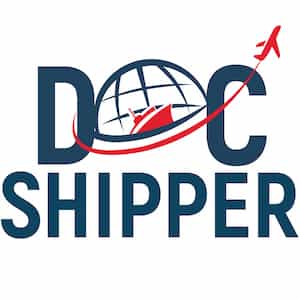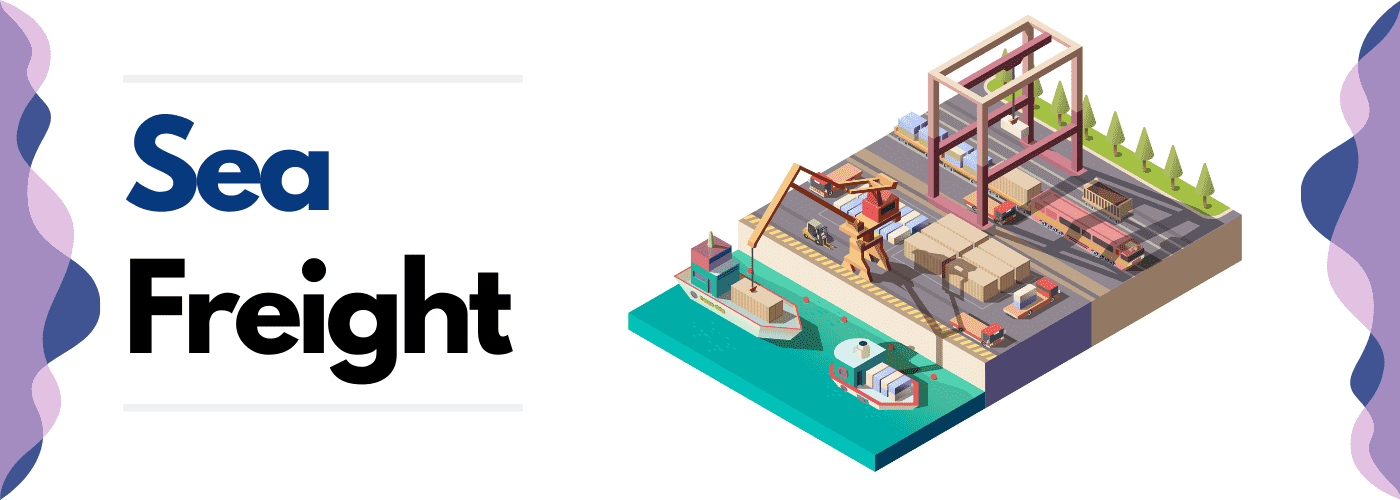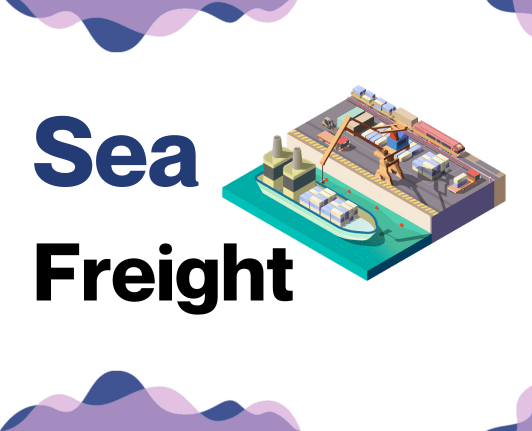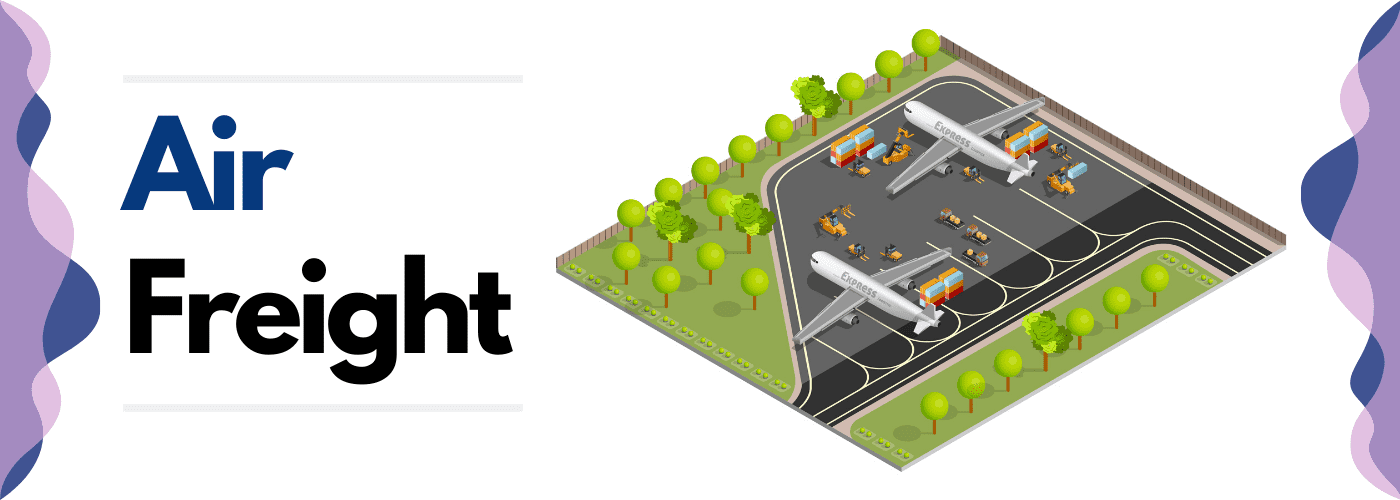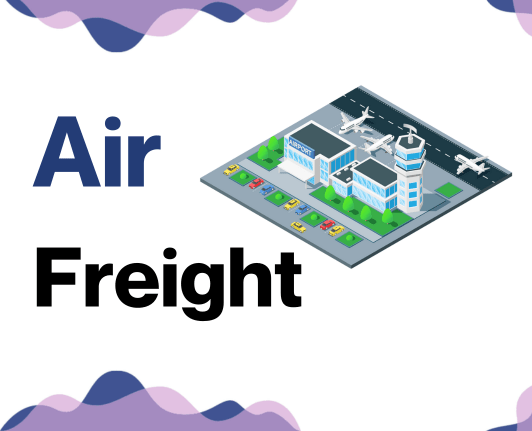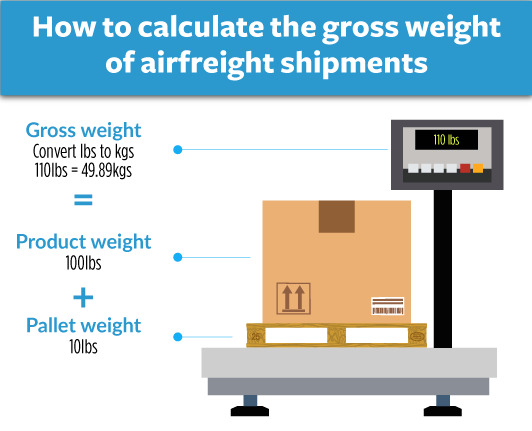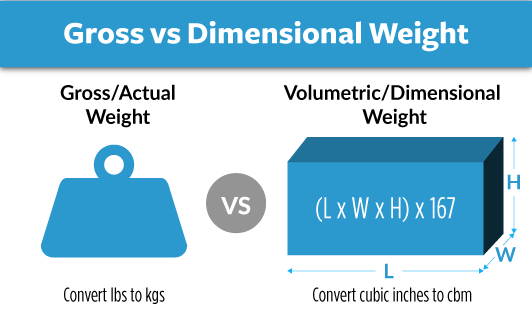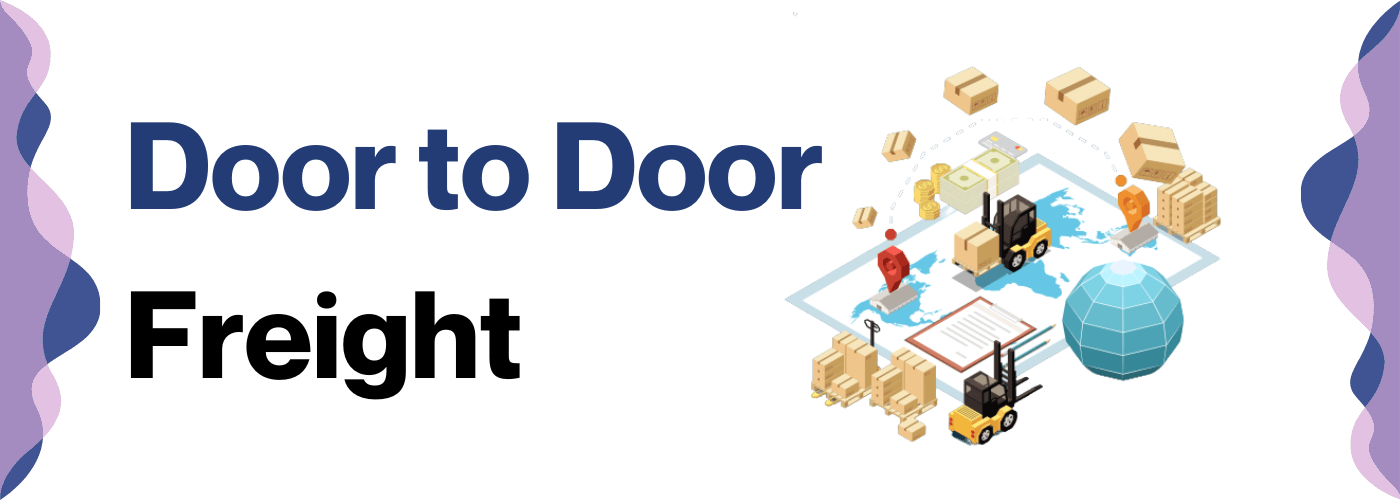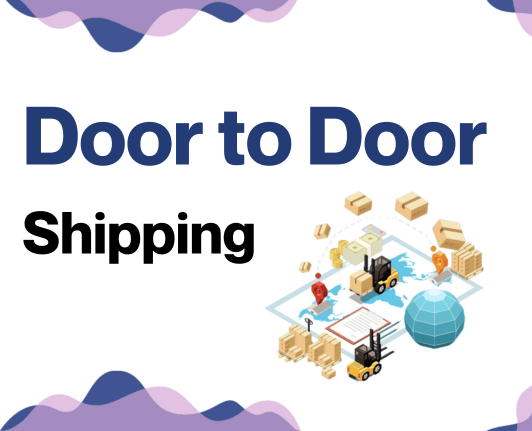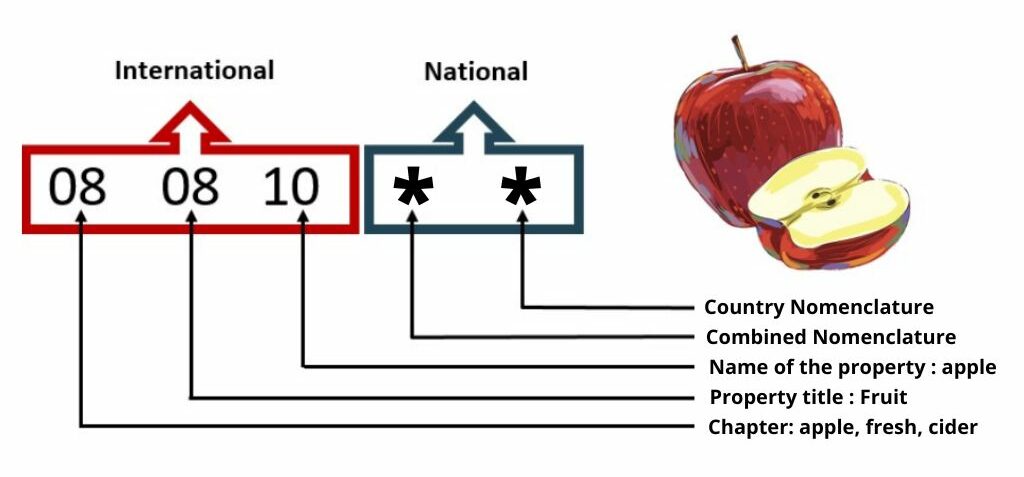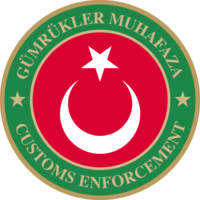Ever try to maneuver a sledge through a tropical rainforest? Yeah, we thought not. Shipping your goods from Malaysia to Turkey may feel just as challenging, with complex rates, transit times, and customs regulations making a simple task seem like an expedition. However, transporting freight between these two vibrant economies doesn’t have to be a jungle.
This guide is your roadmap, packed with valuable insights about various freight options, hints on conquering the customs clearance process, and tips on dealing with duties and taxes.
You'll find advice tailored just for your business every step of the way. If the process still feels overwhelming, let DocShipper handle it for you! As your go-to international freight forwarder, we turn shipping challenges into seamless logistically-successful operations for your business.
Table of Contents
Which are the different modes of transportation between Malaysia and Turkey?
Shipping between Malaysia and Turkey presents unique challenges due to their geographical distance. Picture this: land transport is like driving your car across an entire continent, quite the road trip, right?
Therefore, it's often impractical. So, what's left? Air and ocean freight are like airplanes and cruise ships; they may be more expensive or slower, but they get the job done over long distances. Choosing the right one can be the difference between a stressful journey and a smooth sail. Let's dive deeper to find the best method for your business.
How can DocShipper help?
Looking to bridge the distance between Malaysia and Turkey with your shipment? Trust in DocShipper's deep expertise and efficient logistics solutions. We handle everything from transportation organization to administrative procedures, ensuring smooth customs clearances. Have a query or need a free estimate? Our consultants are just a phone call away. Reach out to us and get all the information you need in less than 24 hours.
DocShipper Tip: Sea freight might be the best solution for you if:
- You're dealing with hefty quantities or oversized goods. Sea transport is your go-to for maximizing space without stretching your budget.
- Time sensitivity isn't a concern for your shipment. Ocean freight is known for its leisurely pace, especially when compared to the speed of air or rail.
- Your supply chain connects key international harbors. This positions you to take full advantage of a wide-reaching network of ocean trade routes.
Sea freight between Malaysia and Turkey
Trading goods by sea between Malaysia and Turkey taps into a rich flow of commerce that connects dynamic Asian and Mediterranean hubs. Key ports like Port Klang and Port TEKSİRDAG serve as lifelines, bridging industrial powerhouses from across these nations. However, while ocean freight is cost-effective for high-volume shipments, it's not a brisk journey.
The choppy waters of transit logistics can become a shipper's nightmare, as complexities emerge from corners unanticipated. Mistakes abound in customs, paperwork, or even calculating freight costs, and even seasoned businesses aren't immune. But fear not. This guide equips you with best practices, shedding light on the labyrinth of shipping challenges.
Think of it this way: Ships don't sail without compasses - and this guide will act as your compass in this trade route. Together, we'll find the smoothest sea route, keeping your goods afloat, despite the odds. Buckle up as we delve into the nitty-gritty of ocean shipping between Malaysia and Turkey.
Main shipping ports in Malaysia
Port Klang
Location and Volume: Situated on the west coast of Peninsular Malaysia, Port Klang plays a key role in the nation's shipping industry, handling over 13.2 million TEU in 2020.
Key Trading Partners and Strategic Importance: Principal trade partners include China, Singapore, and Europe. As the main gateway to the country, it holds strategic importance by being a vital part of the Maritime Silk Road.
Context for Businesses: If you're targeting markets in South East Asia and beyond, Port Klang might be the ideal hub due to its seamless transshipment capabilities and multiple-weekly services to over 120 ports on direct call.
Tanjung Pelepas
Location and Volume: Located in the Johor Bahru District, Tanjung Pelepas is the second-largest port in the country, reporting a shipping volume of 8.9 million TEU in 2020.
Key Trading Partners and Strategic Importance: This port has strong ties with Singapore, Indonesia, and Thailand. Its importance comes from its strategic location at the confluence of the Straits of Malacca and the Straits of Johor.
Context for Businesses: If you're keen on optimizing your transport time for Asian markets, Tanjung Pelepas, with its ultra-modern infrastructure and world-class services, could be a great fit, especially for transshipment traffic.
Bintulu Port
Location and Volume: Bintulu Port, situated on the island of Borneo, had a shipping volume of 1.8 million TEU in 2020.
Key Trading Partners and Strategic Importance: This port mainly trades with Indonesia, China, and the Philippines and is known for being the world's largest liquefied natural gas export facility.
Context for Businesses: For entities shipping energy-related goods to Asian markets, Bintulu Port stands as a strategic choice given its strong foothold in the energy logistics sector.
Tanjung Bruas Port
Location and Volume: Located close to Melaka city, this port isn't one of the largest with around 0.14 million TEU volume, but it's growing rapidly.
Key Trading Partners and Strategic Importance: The key trading partners include countries along the Straits of Malacca, and Tanjung Bruas Port is primarily used for bulk and liquid cargo.
Context for Businesses: If your business handles bulk goods or liquid products and targets markets along the Straits, consider incorporating Tanjung Bruas into your logistics plan due to its specialization in these type of cargo.
Penang Port
Location and Volume: Positioned at the northern part of Peninsular Malaysia, the Penang Port had a volume of around 1.45 million TEU in 2020.
Key Trading Partners and Strategic Importance: Predominantly trading with China, India, and Japan, it is a strategic hub, offering extensive direct shipping lines to over 200 ports worldwide.
Context for Businesses: For those with a wide range of target markets and value fast services, Penang Port’s expansive network and prompt services facilitate swift global trade.
Labuan Port
Location and Volume: Labuan port is located off the coast of Borneo, with a shipping volume of 0.8 million TEU in 2019.
Key Trading Partners and Strategic Importance: Predominantly shipping to Brunei, Sarawak, and Sabah, the port is central to the oil and gas industries, making it strategically important to energy sectors.
Context for Businesses: If your enterprise is in the energy sector, Labuan Port's strong focus on oil and gas-centric infrastructure could make it an ideal choice for your shipping requirements.
Main shipping ports in Turkey
Port of Ambarlı:
Location and Volume: Situated on the Sea of Marmara, the Port of Ambarlı is the primary maritime gateway for Istanbul. It boasts a shipping volume of 3.9 million TEUs annually.
Key Trading Partners and Strategic Importance: The port maintains vital connections with key trading partners in Europe, Asia and North Africa. It serves as a major roll-on/roll-off hub and is strategically important for its cold storage facilities.
Context for Businesses: If you're targeting European, Asian, or North African markets, Port of Ambarlı's location and extensive facilities may prove invaluable to your shipping strategy.
Port of Mersin:
Location and Volume: On the Mediterranean Sea, the Port of Mersin is the largest port in Turkey, with a shipping volume of about 3.6 million TEUs.
Key Trading Partners and Strategic Importance: This port has significant trade relations with Mediterranean countries and stands out for its diverse handling capabilities, accommodating bulk, general and containerized cargo.
Context for Businesses: Businesses looking to ship different types of goods or target Mediterranean markets could significantly benefit from the Port of Mersin's versatile capabilities.
Port of İzmir
Location and Volume: The Port of İzmir, located in the Aegean Sea, has an annual shipping volume of over 1.1 million TEUs.
Key Trading Partners and Strategic Importance: The port has important trade connections with Europe and Asia and is specifically known for its refrigerated storage for perishable goods.
Context for Businesses: If you’re dealing with perishable goods and aim to reach markets in Europe and Asia, the Port of İzmir may be exactly what your supply chain needs.
Port of İskenderun
Location and Volume: The Port of İskenderun is found on the eastern Mediterranean coast and handles over 700,000 TEUs a year.
Key Trading Partners and Strategic Importance: It's notably important for trade routes to the Middle East and North Africa, managing various commodities, including coal, grain, and minerals.
Context for Businesses: Businesses dealing in bulk commodities and look forward to expand in the Middle Eastern and North African markets may gain greatly from the strategic location of the Port of İskenderun.
Port of Haydarpaşa
Location and Volume: Nestled on the Bosphorus Strait, the Port of Haydarpaşa has a significant shipping volume of over 700,000 TEUs.
Key Trading Partners and Strategic Importance: This port facilitates essential trade relations with Eastern European and Black Sea countries and is of strategic importance for container, bulk and general cargo.
Context for Businesses: If your operations involve an extensive variety to be shipped or cater to the Eastern European or Black Sea markets, the Port of Haydarpaşa should be considered in your shipping plan.
Port of Antalya
Location and Volume: Located on the southwestern coast of Turkey, the Port of Antalya manages around 200,000 TEUs annually.
Key Trading Partners and Strategic Importance: Its important trade partners include countries in Southern Europe and North Africa. The port particularly shines with its extensive yacht and cruise services.
Context for Businesses: Businesses in the luxury yacht sector or targeting Southern European and North African markets may find the Port of Antalya an advantageous addition to their logistics operations.
Should I choose FCL or LCL when shipping between Malaysia and Turkey?
Making the right shipping choice between Malaysia and Turkey can heavily influence cost, delivery speed, and overall success. This is why understanding the difference between Full Container Load (FCL) and Less than Container Load (LCL), or consolidation, is crucial.
In the following guide, we disentangle these two principal sea freight options, empowering you with valuable insights to help align your shipping decisions with your specific business needs and goals. Buckle in, because we're about to make your shipping decisions a whole lot easier!
LCL: Less than Container Load
Definition: Less than Container Load (LCL) shipping is an option for transporting smaller freight that doesn't require a full container. Your goods will share a container with other shipments, making it a cost-effective solution.
When to Use: LCL shipment is practical for cargo that doesn't fill up a full container, usually less than 13-15 Cubic Meters (CBM). Its flexible timetable for small volume makes it advantageous for completion of smaller orders or irregular shipments.
Example: For instance, a manufacturing company in Malaysia may need to send 10 CBM of automotive parts to its client in Turkey. Due to its size, sending a full container might not be cost-effective, making LCL freight the better choice.
Cost Implications: On the pricing side, the cost of LCL freight is typically based on the volume of your goods, rather than weight. The rates are more adjustable because you only pay for the space you use. However, it's important to note that LCL may entail higher handling charges per unit due to the handling of different cargoes within a container.
FCL: Full Container Load
Definition: FCL, or Full Container Load shipping, is a freight option where a single container is exclusively used for a single shipment. The entire space of an FCL container, which could be a 20'ft or 40'ft container, is dedicated to one shipper, making this the high-volume shipment choice.
When to Use: FCL is particularly ideal when your cargo volume is more than 13/14/15 CBM. This is mainly due to cost efficiency and safety. Your goods are safe as the FCL container is sealed from origin to destination, minimizing handling risks.
Example: Imagine you're a manufacturer based in Kuala Lumpur needing to ship 15 CBM worth of machinery to Turkey. In this situation, FCL shipping would not just provide safety for your delicate cargo but also yield a cheaper, competitive FCL shipping quote due to the substantial volume of your goods.
Cost Implications: Since FCL utilizes an entire container, costs can be lower for bulk shipments. It turns cheaper per unit with larger volumes. Moreover, you'll avoid potential LCL handling charges upon arrival, further cutting down expenses. The precise price can vary based on various factors, including the nature of the goods and the selected shipping line.
Unlock hassle-free shipping
Experience hassle-free cargo shipping with DocShipper, your trusted freight forwarder. Our ocean freight experts examine factors like volume, budget, and timelines to help determine the best choice: consolidation or full container shipping? No more dilemmas on your Malaysia-Turkey route. Reach out today for a free, no-obligation estimation and take the first step towards a smoother shipping operation. Your goods are our priority!
How long does sea freight take between Malaysia and Turkey?
Shipping goods from Malaysia to Turkey by sea freight typically takes between 22-28 days on average. Remember, these transit times aren't set in stone. They can be influenced by various factors such as the specific ports employed, the weight of your consignment, and the nature of the goods being transported.
For the most accurate estimation, consider partnering with a freight forwarder like DocShipper who can provide a tailored quote for your unique shipping need.
Here's a handy overview of the approximate transit times between the four primary ports in Malaysia and Turkey:
| Malaysian Ports | Turkish Ports | Transit time (days) |
| Port of Klang | Port of Ambarli | 25 |
| Port of Klang | Port of Mersin | 20 |
| Port of Klang | Port of Asyaport | 28 |
| Port of Klang | Port of Evyap | 30 |
*Keep in mind these are only average times, and the exact duration can vary.
How much does it cost to ship a container between Malaysia and Turkey?
Determining the exact ocean freight rates for shipping a container between Malaysia and Turkey can be a complex task. Shipping costs per CBM tend to fluctuate within a wide range, ruled by several variables. The Point of Loading, Point of Destination, the carrier selected, the nature of your goods, and monthly market oscillations all play a pivotal role in this calculation.
This is why providing an upfront, one-size-fits-all price doesn't capture the full picture. However, don't let this unsettle you. Our seasoned shipping specialists scrutinize every detail to achieve the best possible rates for you, offering personalized quotes that reflect your unique shipping scenario.
You can trust us with your shipping needs, knowing we tirelessly work to ensure optimal cost-efficiency for you.
Special transportation services
Out of Gauge (OOG) Container
Definition: OOG containers, also known as Out of Gauge cargo, are special shipping containers designed to handle oversized or irregularly shaped items that cannot fit into standard containers.
Suitable for: Perfectly suitable for heavy machinery, large vehicles, construction materials, and any other large, bulky items.
Examples: If you need to transport large-scale industrial equipment from Malaysia to Turkey, an OOG container might be your best choice.
Why it might be the best choice for you: Out of Gauge containers offer greater flexibility and a certain level of customization, ensuring that even your most uniquely sized items can be securely transported.
Break Bulk
Definition: Break bulk refers to goods that are loaded individually onto a vessel, rather than in containers. These items are typically placed onto pallets or crates.
Suitable for: Ideal for items that might not fit well into containers, including logs, steel or iron beams, and other loose cargo loads.
Examples: If your business involves the shipment of raw materials such as timber or steel from Malaysia to Turkey, break bulk might be the appropriate method for you.
Why it might be the best choice for you: Break bulk allows for the transportation of goods that are too big for containers but not large enough to require a whole charter vessel.
Dry Bulk
Definition: Dry bulk refers to the shipment of unpackaged goods. These are transported in large quantities in the cargo compartments of the ships.
Suitable for: Suitable for granulated, dry commodities like coal, grain, metal ore, or fertilizers.
Examples: If your business involves shipping large quantities of rice or fertilizers between Malaysia and Turkey, dry bulk shipping is an efficient method.
Why it might be the best choice for you: Dry bulk shipping is one of the most cost-effective methods for transporting large quantities of unpackaged goods over long distances.
Roll-on/Roll-off (Ro-Ro)
Definition: Ro-Ro or Roll-on/Roll-off is a shipping method where wheeled cargo, like cars and trucks, are driven on and off a ro-ro vessel.
Suitable for: Designed specifically for wheeled and tracked vehicles, including cars, trucks, semi-trailer trucks, trailers, and railroad cars.
Examples: If you are an automobile dealer exporting cars from Malaysia to Turkey, then Ro-Ro could be the best choice for you.
Why it might be the best choice for you: Ro-Ro is one of the simplest and fastest methods of shipping for wheeled vehicles and heavy equipment.
Reefer Containers
Definition: Reefer containers are refrigerated shipping containers used to transport temperature-sensitive goods.
Suitable for: Ideal for perishable items like fruits, vegetables, dairy products, meat, and pharmaceuticals.
Examples: If your business involves sending fresh produce or pharmaceuticals from Malaysia to Turkey, a reefer container is your go-to option.
Why it might be the best choice for you: Reefer Containers maintain a consistent temperature throughout the journey, ensuring the freshness and quality of your temperature-sensitive goods upon arrival.
At DocShipper, we excel at tailoring our services to your specific needs, including all the shipping options mentioned above. Get in touch with us to get a free shipping quote in less than 24h. Our team will guide you through the most suitable options for your business.
DocShipper Tip: Air freight might be the best solution for you if:
- You're pressed for time or facing a non-negotiable deadline. Air freight delivers unparalleled speed when it comes to transit times.
- Your shipment is modest in size, falling under 2 CBM. Air freight is particularly well-suited for these smaller consignments.
- Your supply chain includes destinations that are off the beaten maritime or rail paths. Air freight gives you access to a comprehensive global airport network.
Air freight between Malaysia and Turkey
For businesses looking to trade between Malaysia and Turkey, air freight is your speed champion, guaranteeing quick and reliable delivery, especially for small, high-value shipments. Picture this: you're exporting designer watches, compact yet boasting a high price tag. Here, air freight shines, keeping transit time low and your products secure.
However, some common mishaps can turn this advantage sour. Imagine judging the shipping cost of your Silk Road spices by their kitchen scale weight, ignoring volumetric weight, a key determinant of air cargo costs.
Or, unknowingly overlooking industry best practices, only to end up paying a premium. These are just appetizers in the vast menu of errors shippers can fall prey to, all of which we’ll unearth and address in the upcoming sections.
Air Cargo vs Express Air Freight: How should I ship?
Juggling between Air Cargo and Express Air Freight for your Malaysia-Turkey shipments? Think of it like this: Air Cargo is like booking a seat on a commercial airline for your goods, while Express Air Freight is more like renting a whole private jet. In this guide, we'll help your business figure out the fastest and most cost-effective option that fits your unique shipping needs between these two countries.
Should I choose Air Cargo between Malaysia and Turkey?
Navigating the seas of international logistics, air cargo stands as a reliable and cost-effective solution for transporting goods between Malaysia and Turkey. Airlines like Malaysia Airlines and Turkish Airlines offer comprehensive air freight services.
Despite longer transit times due to fixed schedules, if your shipments range around 100/150 kg (220/330 lbs), air cargo becomes significantly more attractive. Each airline operates under strict safety measures, ensuring your cargo's secure and timely delivery.
Explore more about these services at Malaysia Airlines' Official Site and Turkish Airlines' Official Website. If budgetary needs align with these parameters, air transit could be your optimal freight method.
Should I choose Express Air Freight between Malaysia and Turkey?
Puzzling over small, urgent shipments from Malaysia to Turkey? Express air freight could be your answer! Specializing in dedicated cargo planes sans passengers, this service shines for cargo under 1 CBM or 100/150 kg (220/330 lbs). Renowned couriers like FedEx, UPS, or DHL can ensure your parcel's speedy delivery.
The sheer convenience, full tracking, and swift customs clearance create a hassle-free shipping solution for pressing needs. So, if time is of the essence, explore express air freight - it might be just the ticket.
Main international airports in Malaysia
Kuala Lumpur International Airport (KLIA)
Cargo Volume: Annually, KLIA handles approximately 726,230 tons of cargo, making it a major hub for freight in Southeast Asia.
Key Trading Partners: Singapore, China, Japan, Hong Kong, and Australia.
Strategic Importance: KLIA is centrally located and acts as a primary gateway to Asia. It's also the headquarters for Malaysia Airlines and AirAsia, providing many connections across the region.
Notable Features: The airport's cargo-handling facility, KLIA Air Cargo Terminal 1 (KACT1), offers specialized storage for goods from pharmaceuticals to live animals. It's also a certified halal logistics provider, ideal for food exporters to Muslim-majority countries.
For Your Business: KLIA is a great choice for any business looking to expand its presence in the Southeast Asia market, offering comprehensive cargo services and many regional connections.
Penang International Airport
Cargo Volume: As of recent statistics, the airport handles over 153,703 tons of cargo annually, making it Malaysia's second-busiest cargo airport.
Key Trading Partners: The US, Hong Kong, China, Singapore, and Germany.
Strategic Importance: The airport's location on Penang Island provides easy access to the bustling Penang Port and the industrial areas around it.
Notable Features: Known for its efficient cargo handling, the airport also has a free commercial zone at Bayan Lepas, an industrial area near the airport which hosts several multinational technology companies.
For Your Business: If electronics or tech is your trade, Penang International can offer an efficient shipping solution alongside potential local business partnerships.
Senai International Airport
Cargo Volume: This airport sees upwards of 67,770 tons of cargo each year, establishing it as a crucial shipping point within Malaysia.
Key Trading Partners: Indonesia, Thailand, Australia, China, and Singapore.
Strategic Importance: Located in the industrial region of Iskandar Puteri, it's close to factories and businesses operating in the area. It's the main gateway for the southern region of Peninsular Malaysia.
Notable Features: Its handling facilities can accommodate an array of cargos, including perishables, dangerous goods, and live animals. The airport also offers warehousing and freight forwarding services.
For Your Business: The proximity to the Iskandar Malaysia industrial area and connectivity to neighboring Indonesian islands make Senai Airport a strategic choice for your freight needs.
Subang Sultan Abdul Aziz Shah Airport
Cargo Volume: The airport handles over 52,000 tons of cargo per year, making it another significant point of shipping within Malaysia.
Key Trading Partners: Singapore, Thailand, Vietnam, and Indonesia.
Strategic Importance: It's situated in Subang, a satellite town of Kuala Lumpur, making it effortlessly accessible.
Notable Features: It's a secondary hub for the region's cargo sector, hosting express courier companies such as DHL and FedEx.
For Your Business: The airport is an ideal choice if speedy courier service for shipping smaller consignments is integral to your business operations.
Langkawi International Airport
Cargo Volume: This airport processes about 7,911 tons of cargo annually.
Key Trading Partners: China, India, UK, Australia, and Indonesia.
Strategic Importance: Strategically located within the Langkawi free trade zone, it provides duty-free trading opportunities.
Notable Features: The airport is known for its quick cargo processing times and its focus on supporting the regional tourism industry.
For Your Business: Langkawi International supports your business by providing fast, efficient cargo services and an opportunity to ship duty-free goods.
Main international airports in Turkey
Ataturk International Airport
Cargo Volume: As Turkey's busiest airport, Ataturk handled approximately 2.4 million metric tons of cargo in the last year it was fully operational (2018).
Key Trading Partners: Ataturk is a global hub, connecting Turkey to Europe, Asia, Africa, and America. Major trading partners include Germany, USA, UK, China, and Russia.
Strategic Importance: Being situated in Istanbul, it played a vital role in bridging East and West. Until it was replaced by Istanbul Airport, this was the primary point for international cargo transportation in Turkey.
Notable Features: Ataturk International Airport features a modern cargo terminal with advanced logistics capabilities, making handling and distribution efficient and effective.
For Your Business: As it's located in Istanbul, it can be an ideal choice if your business deals heavily with countries in Europe and Asia. Despite being partially closed, cargo services still operate here.
Istanbul Airport
Cargo Volume: As the new main hub, it aims to handle 4 million metric tons of cargo annually in its final phase.
Key Trading Partners: Similar to Ataturk, it facilitates Turkey's trade with Europe, Asia, Africa, and America.
Strategic Importance: It's set to be the main air freight hub in Turkey, replacing Ataturk International Airport.
Notable Features: With a dedicated cargo terminal and state-of-the-art facilities, it's one of the world's largest airport projects.
For Your Business: Optimized routing and storage processes can expedite your shipments, particularly useful for businesses with time-sensitive products.
Esenboga International Airport
Cargo Volume: In 2020, it handled 28,361 tons of cargo.
Key Trading Partners: Germany, China, USA, and Russia are among the key trading partners.
Strategic Importance: Located in the Turkish capital, Ankara, it serves as another vital component in the nation's cargo network.
Notable Features: Infrastructure for valuable cargo and cold-chain logistics.
For Your Business: Its cold-chain logistics facilities can be beneficial if you're dealing with perishable goods or pharmaceuticals.
Sabiha Gokcen International Airport
Cargo Volume: In 2019, it handled 34,000 tons of cargo, and it's on track for continued growth.
Key Trading Partners: Again, major trading includes Germany, China, UK, USA, and Russia.
Strategic Importance: It's the secondary international airport in Istanbul and a growing force in Turkey's air freight industry.
Notable Features: It features an integrated logistics environment with various cargo agencies in the vicinity.
For Your Business: It can be a practical alternative for cargo movements to Asia and Europe due to less congestion compared to Ataturk and Istanbul Airport.
Adnan Menderes Airport
Cargo Volume: In 2020, the airport handled around 30,000 tons of cargo.
Key Trading Partners: The key trading partners are the same as for other Turkish airports, including Germany, China, USA, and Russia.
Strategic Importance: Being the main airport of Izmir, it plays a substantial role in facilitating trade in the Aegean region.
Notable Features: It has a robust ground handling system and custom clearance facilities.
For Your Business: If your business involves frequent shipping to the Aegean region and the nearby areas, this airport should be part of your logistics plan.
How long does air freight take between Malaysia and Turkey?
Shipping between Malaysia and Turkey via air freight typically averages between 5 to 8 days. However, this transit time can fluctuate depending on various factors such as the selected departure and arrival airports, the weight of the shipment, and the type of goods being transported.
For the most accurate timetable, it's best to consult with a reputable freight forwarder like DocShipper.
How much does it cost to ship a parcel between Malaysia and Turkey with air freight?
Shipping an air freight parcel between Malaysia and Turkey can cost broadly between $5 to $15 per kg. However, a precise rate is challenging to establish since various factors such as distance from departure and arrival airports, parcel dimensions, weight, and nature of goods drastically impact the final cost.
Rest assured that our team will work closely with you, providing rates tailored to your specific needs, since we quote on a case-by-case basis. Ready to ship or need more information? Contact us and receive a free quote in less than 24 hours. Get the best shipping advice and rates today!
What is the difference between volumetric and gross weight?
Gross weight is your shipment's actual physical weight when measured on a scale, while volumetric weight, sometimes called dimensional weight, considers the space your shipment occupies on an aircraft. These two concepts are crucial in determining your air freight charges.
To calculate the gross weight, simply put your loaded shipment onto a scale, and read off the weight in kilograms. For example, your gross weight might be, say, 50kg (or about 110lbs).
Calculating volumetric weight, however, requires somewhat more math. In air cargo shipping, it's computed with the formula:Length (cm) Width (cm) Height (cm) / 6000 = Volumetric Weight (kg). For express air freight services, the formula becomes: Length (cm) Width (cm) Height (cm) / 5000 = Volumetric Weight (kg).
Let's say you're shipping a crate that's 50cm x 50cm x 40cm. Based on the air cargo formula, the volumetric weight would be 16.67kg (about 37lbs). The same crate would come out to 20kg (about 44lbs) using the express air freight formula.
These calculations matter because your freight charges are determined by the higher of the two weights, whether gross or volumetric. This is because airlines take both the actual weight and the space taken up by the shipment into consideration when allotting space on their planes. For cost-effective shipping, it's essential you're aware of these calculations and how they contribute to your overall air freight charges.
DocShipper tip: Door to Door might be the best solution for you if:
- You value convenience and want a seamless shipping process, as door-to-door takes care of every step from pickup to delivery.
- You prefer a single point of contact, as door-to-door services typically provide a dedicated agent to handle all aspects of the shipment.
- You want to minimize the handling of your goods, reducing the risk of damage or loss, as door-to-door minimizes transitions between different modes of transport.
Door to door between Malaysia and Turkey
Embracing the convenience of international door-to-door shipping can significantly alleviate your logistics hassles. This comprehensive service, which includes pickup and delivery directly from and to your locations in Malaysia and Turkey, simplifies the process, offering efficiency, cost-effectiveness, and peace of mind.
So effortlessly bridge continents with your cargo in tow. Now, let's dive in and explore in detail how we can make this your reality!
Overview – Door to Door
Embarking on the shipping journey from Malaysia to Turkey? Remove the headache and confusion with our sought-after Door-to-Door shipping service, beloved by DocShipper clients. It's comprehensive, handling all the intricate steps, from origin to destination.
Although it may not be the cheapest option, the time and hassle you save are invaluable. Let the experts manage the hurdles of customs clearance and logistics, so you can focus on what matters - your business. Stay stress-free with our ultimate solution that molds complexity into simplicity. Dive in to learn more about the ins and outs of this service.
Why should I use a Door to Door service between Malaysia and Turkey?
Ever felt like the journey from Malaysia to Turkey was just a teleport away? With Door to Door service, it's almost like you have your own personal teleportation device!
1. Stress-Free Logistics: Imagine having your goods whisked away from your premises in Malaysia and appearing right on your Turkish doorstep, without lifting a finger. Door to door service ensures just that. You can say goodbye to navigating the maze of logistics chains; let the pros handle it.
2. Timely Delivery: Got an urgent shipment? Don't fret! Speed is the name of the game in door to door service. The streamlined process cuts down unnecessary delays, ensuring your shipment reaches Turkey faster than you can say Merhaba!
3. Specialized Handling: Does your cargo require extra TLC? With personalized care, even the most delicate or complex shipments are in good hands. Whether it’s your latest tech prototype or a precious heirloom, rest assured they'll get the white-glove treatment all the way.
4. Convenience First: Why deal with trucking when you can focus on more crucial things? Door to door service takes care of everything from pickup to final delivery. That's what we call a smooth move, literally and figuratively.
5. Guaranteed Safe Delivery: With liabilities managed by a single party, your cargo’s safety isn't divided among multiple handlers. From start to finish, your goods are cared for like VIP guests – ensuring they arrive not only fast but also in one piece.
So the question isn't why, but why not? Make every mile of the journey count without counting the miles. That's the beauty of door to door service from Malaysia to Turkey.
DocShipper – Door to Door specialist between Malaysia and Turkey
Enjoy seamless, stress-free shipping from Malaysia to Turkey with DocShipper. We're experts in managing all aspects of transportation - packing, transit, customs processes, across all shipping routes.
We guarantee tailored support with a dedicated Account Executive for your queries. Reach out for a complimentary estimate within 24 hours. Engage with our consultants at zero cost. Your shipping journey, we simplify.
We guarantee tailored support with a dedicated Account Executive for your queries. Reach out for a complimentary estimate within 24 hours. Engage with our consultants at zero cost. Your shipping journey, we simplify.
Customs clearance in Turkey for goods imported from Malaysia
Customs clearance is the process of getting goods legally transported through a country's borders. For goods imported from Malaysia to Turkey, it's a complex jigsaw of customs duties, taxes, quotas, and licenses - potentially adding unexpected costs to your bottom-line.
Overlooking any detail could cause your goods to be stuck in customs, disrupting your shipment schedule and operations. But don't fret – we're going to break this labyrinth down for you, ensuring that you navigate it like a seasoned pro.
DocShipper is at your side, ready to assist with this entire process anywhere in the world. Need an estimate for your project? Just share your goods origin, value, and the HS Code with our team, and we can start the estimate process to make your logistics more predictable. You can't afford oversights in customs; let's ensure you don't have any.
How to calculate duties & taxes when importing from Malaysia to Turkey?
Navigating the complex landscape of international taxes and duties can often feel akin to a maze.
Fortunately, there's a methodology to the madness. The vital pieces of the puzzle in calculating these customs duties dive into details such as the country of origin, the Harmonized System code (HS code), the customs value of the goods, the tariff rate applicable, and other pertinent taxes and fees that might be linked to your specific product type.
Now, our journey through this bureaucratic labyrinth starts at a straightforward point - identifying the country where your goods were birthed, that is, where they were manufactured or produced. This primary step forms the cornerstone of how you will estimate duties and taxes when importing from Malaysia to Turkey.
This little nugget of information can significantly shape the financial landscape of your shipping expedition. So, let's start at the source and keep adding pieces until this puzzle forms a clear picture of your import journey.
Step 1 - Identify the Country of Origin
Knowing where your product originates may seem plain as day, but hold on! It's the foundation stone for your import adventure from Malaysia to Turkey.
Why, you ask?
- Precise knowledge about this allows you to accurately use the Harmonized System (HS) to code your goods.
- It helps you underpin a product's eligibility under specific Turkey-Malaysia trade agreements. For instance, the existence of a 'Re-Export Program'. This will determine if you get duty-free access or not.
- Your choice to import may be affected by country-specific restrictions imposed by Turkey, both for environmental and safety reasons.
- Customs requires documentary proof of the country of origin to determine if the goods are legally permitted into Turkey.
- Lastly, incorrect documentation may lead to delays, fines, and a bumpy import ride!
So remember, a journey of a thousand miles starts with the correct country of origin! Now get that HS code ready!
Step 2 - Find the HS Code of your product
The Harmonized System (HS) code is essentially an international nomenclature for the classification of products. This global standardization system allows countries worldwide to classify traded goods on a common basis for customs purposes. These codes play a pivotal role in determining how much and what kind of duties will be applied to a product.
There are several ways to find the HS Code of your product. In most cases, the simplest approach is to reach out to your supplier. They should be quite familiar with the products they're exporting and the relative regulations, which include the relevant HS codes.
But what if you can't obtain the HS code that way? Don't worry, because we've got you covered. We've outlined an easy step-by-step process to help you find it yourself.
- Firstly, visit the Harmonized Tariff Schedule online tool. Here, you'll find a comprehensive list of HS codes you can use for your reference.
- Next, enter the name of your product in the search bar. It's that simple. You're searching for relevant product names or keywords that best describe your product.
- Once your search results appear, look under the Heading/Subheading column. This is where you'll find your product's HS code.
It's crucial to note the importance of accuracy when selecting an HS Code. Choosing the wrong HS Code could result in shipping delays and possibly even fines - a situation we all want to avoid!
Here's an infographic showing you how to read an HS code.
Step 3 - Calculate the Customs Value
Feeling overwhelmed by the term 'Customs Value'? Not to worry. It's different from your product's price. The Customs Value involves more than just the price of your goods from Malaysia. It's the 'CIF value', which stands for your products' Cost (in USD), insurance cost, and Freight cost combined.
For instance, if you bought goods for $1000, paid $200 for insurance, and spent $300 on shipping, your customs value for those goods would be $1500. It's crucial to get this right since your import duties and taxes in Turkey will be calculated based on this.
So, knowing your CIF value could save you from unexpected costs down the road. Handling logistics shouldn't be a guessing game, right? Stay ahead with accurate calculations.
Step 4 - Figure out the applicable Import Tariff
Import tariffs are essentially taxes imposed on imported goods. Their purpose is to protect domestic industries and maintain economic stability. In Turkey, the most common type of tariff used is the ad valorem tariff, which is determined as a percentage of the product's overall value.
To find the applicable import tariff when importing goods from Malaysia to Turkey, follow these steps:
- Visit the TARIC Consultation Tool by the European Union. You can access it here.
- Input the Harmonized System (HS) code corresponding to your product, and the country of origin - in our case, Malaysia.
- Look up the duties and taxes applied to your product.
For instance:
- if you're importing plastic tableware (HS Code 392410) from Malaysia, you'll get an ad valorem tariff rate of 6.5% for your product category.
- to calculate import duties, you'll need to factor in Cost, Insurance, and Freight (CIF) costs. If your CIF is $10,000, your import tariff will be $10,000 x 6.5/100 = $650.
Take the time to understand and navigate this system, as accurate tariff classification can greatly impact your import costs and overall bottom line. It may seem daunting, but with practice and patience, it will become second nature.
Step 5 - Consider other Import Duties and Taxes
Apart from the standard tariff rate, there may be additional import taxes based on the country of origin and the nature of the product. Take excise duty for instance. Products such as alcohol or tobacco often attract additional taxes, with the rates varying widely.
For example:
- The excise duty on alcoholic beverages could range from 10% to 60% of the CIF value, although these are just estimates and actual rates may differ.
- In certain scenarios, anti-dumping taxes could apply. This typically happens when products are sold at less than their normal value, often damaging the industry in the importing country. Take the hypothetical case of importing steel from Malaysia; Turkey could impose a 4% anti-dumping tax to protect its domestic industry.
- Lastly, there's the Value Added Tax (VAT). In Turkey, the standard VAT rate is 18%, although again, this depends on the product type. For furnitures, for example, it could be 8%. The VAT is generally applied on the CIF value plus the tariff and other import taxes.
These extra charges can significantly impact your costs, so it's crucial to factor them in when planning your logistics budget. Remember, these are just examples, and actual rates can vary. Always double-check with official sources or consult with a customs expert for accurate information.
Step 6 - Calculate the Customs Duties
Customs duties in Turkey depend on several factors: the customs value of your goods, applicable VAT, anti-dumping taxes, and sometimes, excise duty. You can think of it in terms of a cumulative formula:
Customs Duties = (Customs Value x Customs Duty %) + (Customs Value x VAT %) + (Customs Value + Customs Duty + VAT) x Anti-Dumping Tax % + Excise Duty if applicable
Consider these examples:
- Goods with a customs value of $10,000, a customs duty of 5%, but no VAT: Customs Duties = $10,000 x 5% = $500.
- Goods with a customs value of $20,000, a customs duty of 10%, and 8% VAT: Customs Duties = ($20,000 x 10%) + ($20,000 x 8%) = $2,000 + $1,600 = $3,600.
- Goods with a customs value of $30,000, a customs duty of 15%, 18% VAT, 5% Anti-Dumping Tax, and $1000 Excise Duty: Customs Duties = ($30,000 x 15%) + ($30,000 x 18%) + ($30,000 + $4,500 + $5,400) x 5% + $1,000 = $10,995.
Confused with the calculations? Don't worry. DocShipper takes care of every step of the customs clearance worldwide, ensuring you're not overcharged. Reach out and get a free quote within 24 hours.
Does DocShipper charge customs fees?
At DocShipper, as a required part of the process, we handle customs clearance procedures in Malaysia and Turkey, charging a fee for this service. However, this doesn't include customs duties and taxes, which are separate payments made directly to the government. As proof of accurate payments, we provide you with documents from the customs office.
This way, you're assured that all fees you pay are directly related to customs charges, with no hidden costs. This transparency is part of our commitment to making your shipping experience as hassle-free as possible.
Contact Details for Customs Authorities
Malaysia Customs
Official name: The Royal Malaysian
Customs Department
Official website:
Turkey Customs
Official name: Republic of Turkey Ministry
of Trade - General Directorate of Customs
Official website:
Required documents for customs clearance
Deciphering the paperwork for customs clearance can feel daunting. Ever been baffled by Bill of Lading, Packing List, or Certificate of Origin? What about Documents of Conformity?
In this section, we’ll guide you through these essential documents, making your shipping process smoother and more manageable. Let's bid goodbye to the document-related hitches!
Bill of Lading
Navigating the sea of import-export goods from Malaysia to Turkey? The Bill of Lading is your reliable ship's anchor. This essential document validates the ownership transition of your goods from the shipper to your hands. Think of it as a ticket that enables your products to cross oceans.
But don't fret about stacks of paper; in our digital era, a telex release lets you get the document electronically, saving you valuable time and reducing your paper trail. Now, if you’re using air freight, your ticket will be called an Air Waybill (AWB).
This little piece of digital paperwork is a game-changer for business transactions, strengthening your supply chain's speed and efficiency. Ensure you hold on to your Bill of Lading or AWB - it's your golden ticket for moving goods quickly and securely from Kuala Lumpur to Istanbul!
Packing List
Handling shipments between Malaysia and Turkey? Don't overlook your Packing List—a detail-oriented task that calls for your utmost scrutiny. Why? Customs authorities rely on it to verify actual contents versus declared contents.
It's your responsibility to ensure it accurately details product quantities, descriptions, HS codes, and total weight, whether you're shipping via sea or air. Imagine: Customs stumble upon an inconsistency; your shipment could be delayed, incurring unnecessary costs.
Navigation through this stringent process becomes easier when accuracy is a priority, bringing you a step closer to a smooth, hitch-free transit for your goods. Yes, a well-prepared Packing List is that vital.
Commercial Invoice
The Commercial Invoice is a crucial document for exporting goods from Malaysia to Turkey, and minor inaccuracies can stall your shipment at customs. It needs to detail essential information—product description, HS codes, unit value, total value, and the terms of delivery. Remember, your invoice must align impeccably with the B/L or Air Waybill.
Picture a shipment of electronic components; any discrepancies in the description or codes on your invoice could cause customs officers to raise red flags, delaying your cargo and adding unnecessary costs.
Tip: Double-check details and consistency across documents to ensure smooth customs clearance.
Specifically for Turkey, consider getting your invoice certified from Turkish Consulate in Malaysia to avoid potential difficulties at the Turkish customs. It's a little detail but might save you a world of hassle.
Certificate of Origin
Ensuring your shipment from Malaysia to Turkey goes smoothly hinges significantly on the Certificate of Origin. This critical document validates the goods' originating country, influencing customs duty rates.
The benefit? Preferential duty rates under the Turkey-Malaysia Free Trade Agreement, which can save your business a hefty sum.
For example, let's say you're exporting palm oil produced in Malaysia. By mentioning Malaysia as the country of manufacture on your Certificate of Origin, you can avail of lower tariff rates, streamlining your shipping process and boosting your bottom line.
So, always remember to catalogue your goods' origin accurately - the fiscal benefits are too good to pass up.
Certificate of Conformity (CE standard)
Understandably, shipping between Malaysia and Turkey can seem daunting, especially when dealing with important documents.
One you'll frequently encounter is the Certificate of Conformity (CE standard). This certification is not merely a stamp of quality assurance. Rather, it denotes that a product has met the European Union's health, safety, and environment protection standards - key elements that matter when entering the European Market.
While Turkey is not a member of the European Union, it accepts CE markings, which makes your shipping process smoother. However, don't confuse it with the US standards or quality assurance norms.
Remember, getting it right saves you from unnecessary hold-ups, enabling you to deliver promptly to your Turkish clients. As seen, the CE certificate isn't a bureaucratic hurdle, but a valuable tool to expand into European markets.
Your EORI number (Economic Operator Registration Identification)
Sure thing! When shipping goods between Malaysia and Turkey, securing an EORI number is an absolute must. This unique identifier is your golden ticket to smooth sailing through customs - think of it as your passport for goods. Issued by the customs authorities in the European Union, it lets your freight zip through the customs clearance process by tracking every import and export.
Registering for your EORI number might seem like a bit of a hassle, but believe us, the time you'll save (and headaches you'll avoid) during customs clearance is more than worth it. Even though Turkey technically isn't in the EU, they are part of the customs union, so an EORI number is still required.
If you're a business shipping power tools from Malaysia to Istanbul or textiles from Ankara to Kuala Lumpur, this document is your key to success.
Get Started with DocShipper
Navigating the customs maze between Malaysia and Turkey can be a daunting task. With DocShipper, you can breathe easy. Our experts handle every step of the customs clearance process, ensuring your cargo reaches its destination hassle-free. Making international shipping simplified and efficient is our promise. Why wait? Tap into our expertise. Contact us now to receive a free, no-obligation quote within 24 hours.
Prohibited and Restricted items when importing into Turkey
Shipping goods into Turkey? You'd be wise to first familiarize yourself with the list of prohibited and restricted items. Overlooking these can lead to delays, hefty fines, or even seizure of the goods, causing significant disruption to your business operations. Let's avoid these hurdles by delving into the specifics.
Restricted Products
- Firearms & Ammunition: You will need to apply for a special license from the General Directorate of Security. Any type of gun or ammunition for sport or hunting falls into this category.
- Chemicals: If your goods fall under this category, you have to seek a permit from the Turkish Ministry of Environment and Urbanization. This includes pesticides or anything involving hazardous chemicals.
- Medical Equipment & Pharmaceuticals: You'll need a specific license from the Turkish Ministry of Health. Don't forget to verify if your medical devices or drugs fall into this category.
- Plants and Plant Products: Get a necessary permit from the Turkish Ministry of Agriculture and Forestry. This includes live plants, seeds, and other plant products.
- Animal Species (Live or derivatives) & Pets: You are required to get a permit from the Turkish Ministry of Agriculture and Forestry. This covers live animals, animal products, or import for pets.
- Telecommunications Equipment: You have to apply for a particular license from the Information and Communication Technologies Authority. This involves devices like mobile phones, internet equipment, and other communication tools.
- Gold, Silver & Precious Stones: Contact the Undersecretariat of Treasury to apply for needed permits. This includes both raw and processed forms of these items.
- Alcoholic Beverages & Tobacco: You have to secure a permit from the Turkish Alcohol and Tobacco Market Regulatory Authority. This includes all types of alcoholic beverages and tobacco products.
Ensure to comply with these regulations as failing to do so can result in your shipment being denied entry into Turkey. Knowledge of these specifics may prevent potential setbacks on your shipping journey.
Prohibited products
- Narcotics and drugs without a prescription
- Items featuring undesirable (or offensive) prints and/or publications
- Certain agricultural products to prevent the spread of pests and diseases
- Counterfeit goods and materials
- Radioactive materials
- Chemical weapons and certain toxic industrial chemicals
- Indecent or obscene materials and literature, including pornographic material
- Products or materials protected under intellectual property
- Unauthorized firearms and ammunition
- Any goods from embargoed or sanctioned countries, as per Turkish law
- Wild fauna and flora, as protected under CITES (Convention on International Trade in Endangered Species of Wild Flora and Fauna).
Are there any trade agreements between Malaysia and Turkey
Yes, there is a Free Trade Agreement (FTA) in place between Malaysia and Turkey which can greatly benefit your business. This bilateral FTA, in effect since 2015, reduces tariffs and promotes trade in goods and services, investment, and economic cooperation.
Furthermore, ongoing initiatives are exploring opportunities in digital trade, setting up a promising future for e-commerce.
So, whether you're shipping electronics or textiles, this agreement could potentially lower your costs and enhance market access. It's definitely a significant component to consider in your shipping strategy.
Malaysia - Turkey trade and economic relationship
Bridging Southeast Asia and the Middle East, the Malaysia-Turkey relationship dates back to the Ottoman Empire era. This flourishing economic bond saw a significant shift in 2015 with the signing of a Free Trade Agreement (FTA), cementing their ties. Integral sectors including palm oil, electrical and electronic product trade have especially benefited.
Honoring this historical partnership, trade between both countries has escalated over the years. In 2022, the bilateral trade volume reached $4.6 billion, with Malaysia's main exports being palm oil, machinery, and transport equipment.
As for Turkey, their prime exports, like tobacco and copper scrap. This ever-sprouting economic bond continues to create exciting possibilities for both nations.
Your Next Step with DocShipper
Troubled by the complexities of shipping between Malaysia and Turkey? Let go of your worries! At DocShipper, we turn hassles into a smooth sailing journey. Experts in freight, customs, and everything in between, we guide you through each step, making the process easier. Why struggle when you don't have to? Contact us today and focus on what you do best - running your business.
Additional logistics services
Explore beyond shipping with our comprehensive services! We streamline your supply chain, handling all logistical aspects from warehouse management to delivery. We're not just a freight forwarder, we're your end-to-end supply chain partner.
Warehousing and storage
Finding reliable warehousing when shipping between Malaysia and Turkey can be daunting. It’s critical, especially when your goods, like pharmaceuticals or fine foods, require temperature controls. Envision no more worries over sudden spoilage or damage! To put your concerns at ease, explore our dedicated Warehousing page for more info.
Packaging and repackaging
When shipping goods from Malaysia to Turkey, the right packaging can make all the difference in ensuring your items arrive safely. That's where our reliable packaging and repackaging services come in, tailoring solutions to goods of all types, from fragile antiques to bulky machinery.
Imagine shipping an antique vase without a scratch or large industrial equipment undamaged; it's possible with the right packaging. More info on our dedicated page: Freight Packaging.
Cargo insurance
Cargo insurance isn't just about recovering from disaster; it's a pro-active tool for your business. Unlike fire insurance focusing only on loss due to blazes, it caters to a wider array of misfortunes in transit - from damage to complete loss.
Imagine a shipment of electronics rendered useless by a sudden storm at sea. With the right insurance, your loss is covered! For all the details, check out our dedicated page: Cargo Insurance.
Supplier Management (Sourcing)
Struggling to source goods from Asia or East Europe? Let's bring those walls down! DocShipper can be your ally, securing reliable suppliers and steering the entire procurement process for you. Don't sweat the language and local customs – we've got it covered!
Like we did when connecting a Turkish fashion retailer with a high-quality fabric manufacturer in Malaysia. Learn how we can simplify your sourcing journey on our dedicated page: Sourcing services.
Personal effects shipping
Need to move your grandmother's vintage piano or a precious sculpture from Malaysia to Turkey without a hitch? Our Personal Effects Shipping service handles bulky or fragile items with utmost care and flexibility.
Real world example: We once safely transported a 400-year-old antique ottoman - delicate logistics, met with professionalism. For complete peace of mind, visit our dedicated page: Shipping Personal Belongings.
Quality Control
Quality inspections are your insurance against unexpected surprises during Malaysia-Turkey shipping. For instance, flawed textiles detected early can save re-shipment costs. By scrutinizing manufacturing or customization, you ensure your products adhere to standards, saving you potential legal and financial complications.
Explore more on how this service is your path to seamless transportation on our dedicated page: Quality Inspection.
Product compliance services
Compliance can be a complex hurdle when shipping goods internationally. No need to worry, though. We're here with our Product Compliance Services, ensuring your items meet all required regulations. How? We conduct thorough laboratory tests for certification, so you can ship confidently, knowing your products are compliant. More info on our dedicated page: Product compliance services.
FAQ | For 1st-time importers between Malaysia and Turkey
What is the necessary paperwork during shipping between Malaysia and Turkey?
Our process requires certain documentation for a seamless shipping experience from Malaysia to Turkey. With sea freight, the indispensable document is the bill of lading while air freight requires an air waybill. Rest assured, we'll arrange these on your behalf. As for your part, you'd need to supply us with your packing list and commercial invoice at least. In specific cases, more paperwork may be necessary based on your goods - this could include documents like Material Safety Data Sheets (MSDS) or various certifications. This way, we ensure a smooth transition through all stages of the shipping process, ultimately making your international business operations flow seamlessly.
Do I need a customs broker while importing in Turkey?
Indeed, we recommend employing a customs broker for importing goods into Turkey due to the intricate process and the requirement for specific details and paperwork. As a freight forwarder, DocShipper can service your needs in this area. Our team adeptly manages your cargo at customs for the majority of shipments, alleviating the pressures brought on by the complexities of customs clearance in Turkey. By using our services, you won't have to navigate the challenges single-handedly, and your cargo will be processed smoothly.
Can air freight be cheaper than sea freight between Malaysia and Turkey?
In determining whether air freight or sea freight from Malaysia to Turkey would be cheaper, it's important to consider several factors including the route, weight, and volume of your cargo. Generally, if your cargo is less than 1.5 cubic meters or weighs less than 300 kg (660 lbs), air freight may be a more cost-effective option. Regardless, our team at DocShipper will ensure you are provided with the most competitive option. Your dedicated account executive analyzes your specific requirements and guides you to the shipping method that best suits your needs.
Do I need to pay insurance while importing my goods to Turkey?
While we at DocShipper don't impose a mandatory requirement for insurance on goods being imported to Turkey, we strongly recommend getting it. Insurance can serve as a safety net, protecting you financially against a range of unexpected incidents, such as damage, loss, or theft that might occur during the transit. By choosing to secure insurance, you're adding an extra layer of assurance to your valuable goods while they make their journey, giving you peace of mind in an unpredictable shipping environment.
What is the cheapest way to ship to Turkey from Malaysia?
Given the territorial distance between Malaysia and Turkey, we generally recommend sea freight as the most cost-effective shipping method. Although transit times are longer compared to air freight, it's significantly cheaper for heavy and voluminous cargo. Please note prices can vary based on factors including the weight/volume of your shipment, the nature of goods, and fluctuating fuel prices, so it's always beneficial to seek customized advice.
EXW, FOB, or CIF?
Choosing between EXW, FOB, or CIF greatly depends on your relationship with your supplier, and their knowledge of logistics. Remember, they aren't likely to be logistics experts. Therefore, it might be safer to delegate some tasks to a trusted agent like us at DocShipper. Suppliers typically sell under EXW (ex works, i.e., from their factory door) or FOB (free on board, meaning all local charges are covered up to the departure terminal). Regardless, we can ensure a seamless transportation process with our door-to-door service. This is designed to simplify your task and let you focus on your core business. Pass us the baton and enjoy a smooth, hassle-free freight forwarding experience.
Goods have arrived at my port in Turkey, how do I get them delivered to the final destination?
When your goods arrive at the port in Turkey under CIF/CFR incoterms, you require a custom broker or a freight forwarder to clear goods, pay import charges, and deliver to your final destination. However, if you wish to simplify the process, DocShipper offers a DAP service, encompassing everything from customs clearance to final delivery. For specifics, consult with your dedicated DocShipper executive.
Does your quotation include all cost?
At DocShipper, we pride ourselves on transparency and clarity in our pricing. Our quotation covers all costs with the exception of duties and taxes at your goods' destination. But don't fret - if you're unsure about these, your dedicated account executive is always available to provide an estimate for you. That way, there are no hidden fees and no unexpected surprises.
